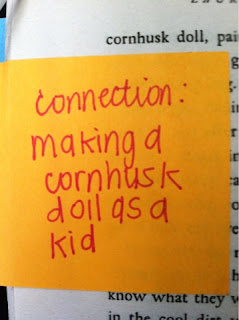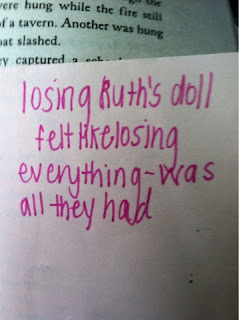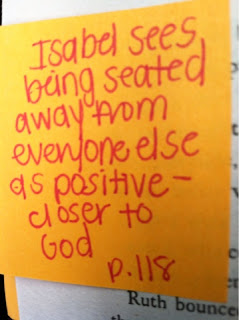As a child reading
Charlotte's Web I enjoyed the storyline, particularly the relationships developed between Wilbur and Fern and Wilbur and Charlotte. These are some of the same things I find myself enjoying as an adult reader. As an educator focused on the literacy aspect I found myself reading for purposes I never would have imagined as a child.
One of the first things that I focused on quite naturally as a reader was the characters in the text. First and foremost, I was struck by the tenderness and compassion of Fern. She immediately jumped in to save Wilbur and treated him with such kindness, nurturing him as if he was a real child. The act of her bottle feeding him and running home to play with him showed this kind side. I also noted the way that Fern's tenderness and compassion were shared with her father. When first meeting Mr. Arable it appears as if he is quite the opposite of his daughter. However, Fern's emotional response to the possible death of Wilbur evokes a new side of Mr. Arable. This reveals what kind of a character he is, showing that he is quite empathetic. This sets the tone of how Mr. Arable is portrayed through much of the rest of the book. One particular instance that really struck me with Mr. Arable is when Mrs. Arable is very upset about the way Fern is acting. She is so worried when Fern says she talks to animals, and Mr. Arable simply responds with "Maybe our ears aren't as sharp as Fern's." This shocked me a little bit because Mr. Arable always seemed to mean business, but this reinforces the idea of his kind and emphathetic personality. I identified slightly with Mr. Arable at this point in the text, wondering myself if animals really do talk, and we just aren't listening.
Right off the bat it is possible to notice how White portrays Wilbur in such a personal way. He is not just a pig, but an essential character in the book that anyone would be hard-pressed to not fall in love with. Wilbur's thoughts and feelings are portrayed in the same way that any other character's are. He almost feels human. Once Wilbur moves to the farm it is heartbreaking to experience his loneliness along with him. When he finally hears Charlotte's voice there is a definite sense of foreshadowing to his development of a new friend. The animals reaction to his call for his friend the next morning is not the most kind. It really made me wonder if their relationship would remain static or begin to change along with the storyline. Of course as time went on I learned that it was the latter.
I was immediately drawn to the way Charlotte is portrayed by herself versus how Charlotte is portrayed by Wilbur. Upon first meeting Charlotte demonstrates through her thoughts and actions that she is pretty, intelligent and talented. Wilbur thinks of Charlotte as blood-thirsty, brutal and fierce. It is interesting to see how Wilbur's thoughts change about Charlotte throughout the text.
Templeton, while not being a main character, is given the opportunity to grow and change. Initally Templeton is described as immoral, inscrupulous, incosiderate, indecent, unfriendly, ruthless and without conscience. While he never completely leaves this description, he does show his good side in regards to Charlotte and Wilbur. While he does not seem to experience a complete change of heart, he finds a common ground with Wilbur on which they are able to strike a deal. While I think this deal intially is what helps him to do good, there may be some good sentiments behind it that are hidden behind his constant need to show he does not care for anyone else.
I find it interesting the emotional appeal Charlotte has as a character. To many spiders are simply evil, something we run away from and kill at any costs. However, it is hard to find someone who reads this book and does not feel heartbroken when Charlotte dies. She is a kind, loving character, not the malicious, scary spider we see in real life. I love the way White highlights the good things that spiders do, particularly when talking about the wonders of making a web. The reference to the Queensborough Bridge is highly relevant to many of the students I work with today, and creates an interesting perspective around this arduous yet fairly quick task of making a web.
Upon finishing reading and looking back, signs of Charlotte's impending motherhood are apparent early on in the book. A conversation occurs between Charlotte and Wilbur on pages 64 and 65 that reminds me of many a conversation I have had with my own mother. Wilbur bargains with Charlotte about getting food and drink, testing how far he can go. While she gives just a little bit she ultimately knows he is procrastinating and sends him to bed, but not before saying good night. Additionally, Wilbur is not someone who really thinks very much of himself, but through Charlotte's Web he finally starts to see himself as something. When she writes the the word "terrific" he feels terrific. When she writes the word "radiant" he feels and acts radiant. While literally saving Wilbur's life, it seems as if she figuratively saves his life as well. Before Charlotte came along Wilbur would often feel lonely and withdrawn, as if he didn't really matter to anything or anyone. The words of Charlotte's web, as well as her kind demeanor changed Wilbur's mind, and the minds of the Arable's, Zuckerman's and the farm animals. Charlotte only continued to further her character when she chose to accompany Wilbur to the fair, despite her ailing health. Charlotte breaks character, if only for a moment when she declares that for once she needs to do something for herself; make her egg sac. However, while this is portrayed as a selfish act on Charlotte's behalf, it's perhaps the most selfless thing she ever did. The legacy she left behind only continued to foster Wilbur. While Charlotte's character remains rather static, Wilbur's continues to evolve. However, Wilbur's character would never undergo this evolution without the help of Charlotte. When Charlotte's work was over, she smiled and waved goodbye, dying on her own. This is perhaps the emotional climax of this book, and one that as an adult still brings me to tears. It's almost as if even though Charlotte was always surrounding by others, she was really, truly alone.
/
Lastly, while reading this book again I had a revelation about Fern. When you first start reading this book you expect Fern to be a main character. However, the relationship that truly evolves is not between Fern and Wilbur but between Wilbur and Charlotte. Often, I feel that people dismiss Fern's character pretty quickly into this novel. I have come now to see Fern's character and storyline as a "coming of age" story. Fern grows from this young child who is so emotionally distraught over a pig, to a mature young girl, all over the course of a few months. This transformation is mostly in thanks to Wilbur, although he does nothing himself to foster it. Fern, while typically on the back burner, is perhaps one of the most important characters of all.
Re-reading this novel as an adult really grew my ideas around it. I think it is important for educators to participate in this practice in order to grow as readers, and to help their students grow.










.JPG)
.JPG)
.JPG)